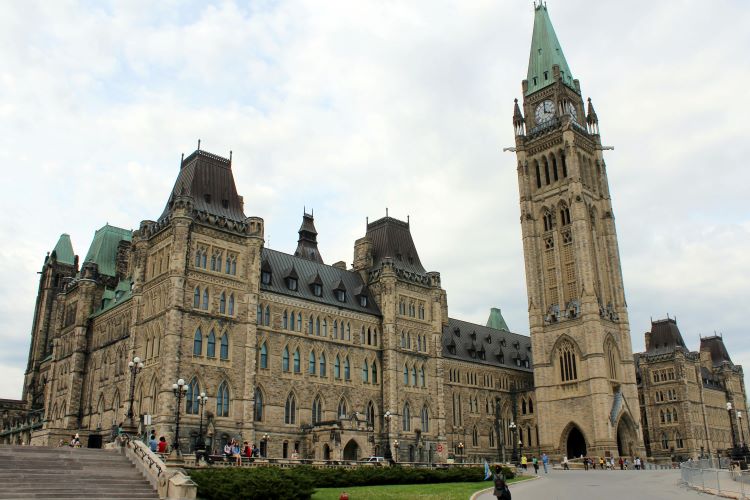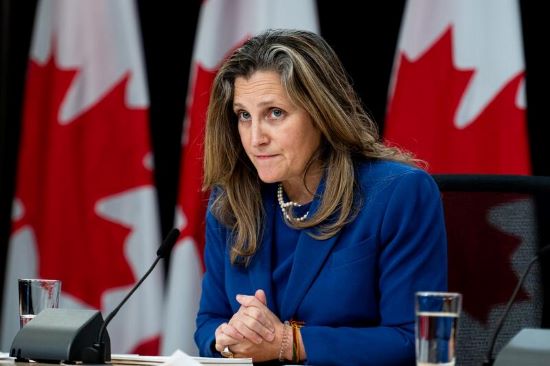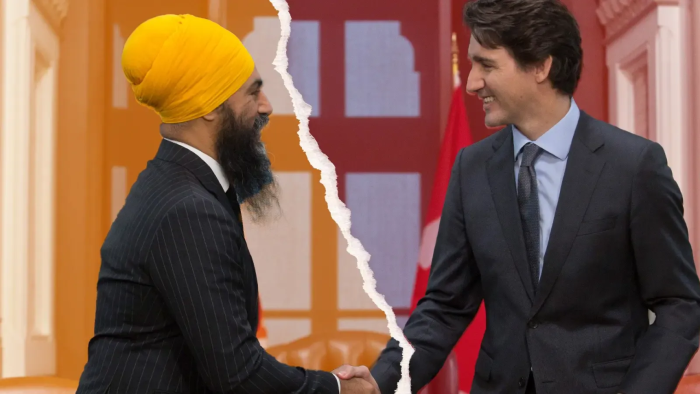Canada’s political landscape has been shaken to its core. Prime Minister Justin Trudeau, once hailed as the face of progressive leadership, has announced his decision to step down after nearly a decade in power. While his resignation isn’t immediate, the announcement signals a significant turning point for the country. For many in the African diaspora, this raises an important question: Why would a leader announce his resignation yet remain in office? The answer lies in Canada’s political traditions — and the growing realization that Trudeau’s once-glowing legacy has dimmed amid scandals, economic challenges, and dwindling support from key allies, including NDP leader Jagmeet Singh. As the nation braces for an impending election, the stage is set for a dramatic political shift that could reshape Canada’s future.
The Fall of a Political Star

Justin Trudeau’s rise to power in 2015 was nothing short of meteoric. With his youthful energy, progressive ideas, and a famous surname, he embodied the fresh start many Canadians yearned for after nearly a decade of Conservative rule under Stephen Harper. His early days were filled with grand promises — reconciliation with Indigenous peoples, tackling climate change, and restoring Canada’s global image.
But politics, like life, is a marathon, not a sprint. And as Trudeau’s years in office stretched on, cracks in his leadership began to show. Scandals, missteps, and an increasingly disillusioned public began to take their toll. The very charm that propelled him to power seemed to wear thin as Canadians struggled with rising living costs, housing shortages, and economic uncertainty.
Why Resign, but Stay in Office?
For those unfamiliar with Canadian politics, Trudeau’s announcement may seem odd. Why resign and still remain in office? In Canada’s parliamentary system, a prime minister’s resignation doesn’t mean an immediate departure. Trudeau will stay on as leader until the Liberal Party selects his successor, ensuring stability in government during the transition.
It’s a strategic move. Leaving immediately would create a leadership vacuum and risk throwing the party into chaos. Staying on allows Trudeau to maintain some control over the transition and, perhaps, salvage his legacy. However, his continued presence might also remind Canadians of the very issues that led to his downfall.
A Legacy Tarnished by Scandals
Trudeau’s decision to resign didn’t happen in a vacuum. His leadership has been marred by high-profile scandals that eroded public trust.
The SNC-Lavalin affair in 2019, where Trudeau was accused of interfering in a criminal prosecution to protect a Quebec-based engineering firm, dealt a serious blow to his image. Then there was the blackface controversy, a series of old photos and videos showing Trudeau wearing blackface, which surfaced during his 2019 re-election campaign, causing outrage both at home and abroad.
These scandals chipped away at the progressive, inclusive image Trudeau once projected. His critics saw him as a leader who preached high moral values but often failed to live up to them.
A Political House of Cards

The resignation of Chrystia Freeland, Trudeau’s finance minister and deputy prime minister, in December 2024 marked a significant turning point. Freeland, a longtime ally, departed over policy disagreements, notably concerning the handling of impending U.S. tariffs proposed by President-elect Donald Trump. Her exit was more than a resignation; it was a public indictment of Trudeau’s leadership.
Freeland’s departure echoes the seismic fallout from Jody Wilson-Raybould’s demotion in 2019. Wilson-Raybould’s principled stand against political interference in a criminal case marked a turning point in Trudeau’s popularity. Both episodes underscore a recurring theme: Trudeau’s struggle to reconcile his lofty ideals with the gritty realities of governance.
Economic Struggles and Public Discontent
Canada’s economy, once a pillar of Liberal strength, now serves as a lightning rod for criticism. Housing affordability has plummeted, inflation has strained household budgets, and unemployment remains stubbornly high. Housing prices are expected to rise by 6% in 2025, reaching an average of $856,692, further straining affordability. Inflation has returned to the Bank of Canada’s target of 2%, down from 2.9% in January. The unemployment rate has risen to 6.8% and is not expected to worsen over the course of 2025.
Trudeau’s carbon tax and immigration policies have alienated key voter blocs, creating a fertile ground for opposition leader Pierre Poilievre to exploit.
An Ipsos poll revealing that 73% of Canadians want Trudeau to resign reflects a profound shift in public sentiment. Even among Liberal voters, 43% wanted him to resign, reflecting significant public dissatisfaction. This is a damning indictment of Trudeau’s leadership and a stark warning for his party.
Jagmeet Singh’s Withdrawal of Support: The Final Blow

The political death knell came from an unexpected source — Jagmeet Singh, leader of the New Democratic Party (NDP). For years, Singh’s party propped up Trudeau’s minority government, providing crucial support in Parliament.
But Singh recently withdrew that support, accusing Trudeau of failing to address Canada’s economic and social challenges. In a fiery statement, Singh declared that the Liberals had lost their way and that it was time for a new direction. His move effectively signaled the end of Trudeau’s government and forced the prime minister’s hand.
Without the NDP’s backing, Trudeau had little choice but to step aside. His government could no longer function without support from the opposition.
A Conservative Wave on the Horizon?
With Trudeau stepping down, all eyes are now on Pierre Poilievre, leader of the Conservative Party. Poilievre has positioned himself as a champion of affordability, promising to tackle inflation, housing costs, and taxes — key issues for many struggling Canadians.
Poilievre’s message has resonated with voters frustrated by the Liberals’ handling of the economy. Polls show the Conservatives gaining momentum, with many Canadians ready to give the party a chance after nearly a decade of Liberal rule.
For African immigrants in Canada, a Conservative government could bring changes in policies around immigration, housing, and social programs. It remains to be seen whether Poilievre’s government would embrace diversity and inclusivity in the same way the Liberals did.
The Trump Factor
Adding complexity to Canada’s political landscape is the return of Donald Trump to the U.S. political scene. Trump’s rocky relationship with Trudeau during his first term as U.S. president was no secret.
Trump often targeted Trudeau, accusing Canada of unfair trade practices and threatening tariffs on key Canadian exports. The two leaders shared frosty exchanges, with Trump once calling Trudeau “weak and dishonest” after a G7 summit.
Now, with Trump poised to make a political comeback, Canada’s next prime minister will need to navigate an unpredictable relationship with its southern neighbor. For Trudeau’s successor, this will be a key challenge — balancing Canada’s economic interests while managing Trump’s often combative style.
What Comes Next for Trudeau?
For Trudeau, the announcement of his resignation marks the end of an era, but not necessarily the end of his political career. Some speculate that he might take on a global role, similar to former U.K. Prime Minister Tony Blair, working on international issues such as climate change and human rights.
Others believe he will quietly retreat from public life, focusing on his family and reflecting on his legacy.
But for now, Trudeau remains in office, a symbolic figure of a government in transition. His final weeks as prime minister will likely be spent shaping his exit and preparing the Liberal Party for a leadership race that could determine its future.
A Nation at a Crossroads
Canada is at a political crossroads. Trudeau’s departure signals the end of one chapter and the beginning of another. For many Canadians, it’s a time of uncertainty — will the next government address their economic concerns, or will it bring further instability?
For African immigrants, this moment serves as a reminder of the importance of staying engaged in Canada’s political process. Leadership changes can bring new policies that affect everything from immigration to employment to housing.
As Trudeau prepares to exit the stage, Canada must decide what kind of future it wants. Will it be a continuation of progressive ideals, or a return to more conservative policies? One thing is certain — the country’s political landscape will never be the same again.
For Justin Trudeau, the walk in the snow has begun. And for Canada, the journey ahead is filled with both challenges and opportunities.
